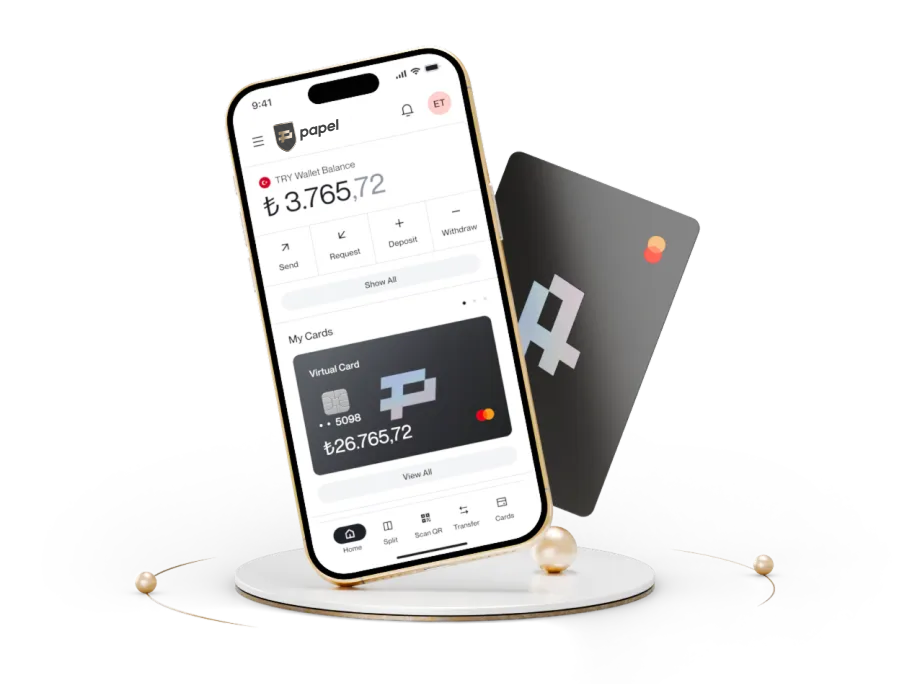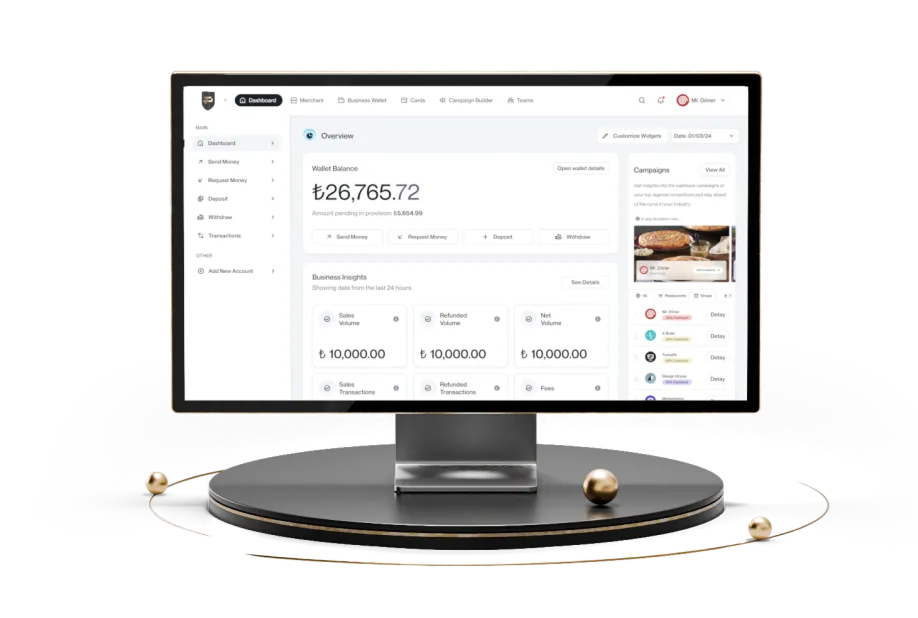Easy and Secure Online Payments with Internet Banking
Due to new-generation technologies, internet banking has become increasingly widespread and easily accessible. As the number of transactions that can be done without the need to visit the branch increases, our lives become easier, and financial transactions can be carried out securely within minutes.
Let's explore together what Internet banking is, how to use it, potential risks, and ways to protect yourself, all of which contribute to improving our quality of life…
What is Internet Banking?
Internet banking is the general term for online services that allow banking transactions to be performed through devices such as computers, tablets, and phones with Internet connectivity.
Internet banking offers customers a range of advantages in financial transactions, such as flexibility, convenience, speed, and security. This allows us to carry out many banking operations easily and securely without the need to physically visit a bank, including various payment transactions, money transfers, card transactions, tax payments, SGK premium payments, and applications for loans and cash needs.
How to Register for Internet Banking?
Registering for internet banking is simple. You can visit the website of the bank or financial institution you want to use and click on the button labeled “I want to register” or “open an account” to complete the account opening process through internet banking. Within a few minutes, you can upload your information to the institution's website and complete the process of becoming a customer from the comfort of your home.
Making Online Payments with Internet Banking
Making online payments through internet banking is simple. First, you need to log into your account. After logging in, you select the type of payment you wish to make. The process is initiated by choosing one of the categories such as bill payments, institutional payments, municipal payments, or tax payments.
Each bank may offer different categories for payments. The commonly available online payment categories include:
- Loan Payment
- Credit Card Payment
- Institutional Payments
- Bill Payments
- Tax Payments
- SGK Payments
Of course, the types of payments you can make can cover much more. Discover the fast and easy payment methods offered by Papel.
What Methods Can I Use for Online Payments?
Internet banking allows for various payment methods. This enables you to complete your payment transactions quickly, easily, and effortlessly.
Money Transfer
With internet banking, you can perform transactions like bank transfers and EFTs online. You can save the transaction and set up instructions to ensure your recurring payments are not interrupted.
Virtual Card
In today's environment, internet banking is often considered alongside mobile banking. This is because almost every institution that offers internet banking services also provides mobile banking services.
As a part of these services, prepaid virtual cards are also considered an aspect of internet banking services. This allows you to use the money deposited in your bank account with virtual card details without the need for a physical bank card, making online shopping easy and convenient.
Mobile Payment
Mobile payments can be made through phone banking. It allows you to send money or make payments in an effortless, fast, and secure manner. You can access our detailed article on this topic here.
Internet Banking e-Government Access
In addition to payment and financial transactions, internet banking is also used in our country to securely log into the e-Government system. By using the user information you use to log into the internet branch, you can log into your e-Government account and easily handle your official transactions.

Security in Internet Banking
While organizations take maximum security measures within their systems to ensure the security of internet banking, users also have important responsibilities.
Tips for Secure Payments
Strong Password: For a secure internet banking experience, your passwords should be simple enough for you to remember but complex enough that others cannot guess them. Set your passwords according to the password creation rules provided and change them regularly. Additionally, avoid using the same password on different platforms.
Two-Factor Authentication (2FA): Many organizations use two-factor authentication when logging into your internet banking account. A verification code is sent to your phone when you log in from a computer, providing an extra layer of security.
Trusted Devices: You should have complete control over the device you use for internet banking transactions. Perform your transactions on reliable and personal devices. Conducting banking transactions on public devices can create security vulnerabilities.
Updated Software and Antivirus Programs: Whether it's a computer or mobile device, keep the operating systems and banking applications of the device you will use for banking transactions up to date. Actively use antivirus programs to protect against malware and regularly scan your devices.
Secure Internet Connection: One of the most critical aspects of internet banking is the security of the internet network on which the transaction is performed. Make your transactions on protected networks that you are sure are secure. We recommend avoiding internet banking transactions on public Wi-Fi networks.
Banking Notifications: Many financial institutions make serious investments to provide the most secure internet banking and inform their customers as soon as they detect a vulnerability or danger. However, to receive these notifications, you need to keep the communication channels between you and the institution open. By keeping at least one of the phone, SMS, or email notifications open, you can be more quickly informed about security-related issues.
Regular Account Monitoring: Many measures can prevent suspicious transactions, but you should still be cautious. Regularly log into your internet banking accounts and monitor your account activities. If you detect any unauthorized transactions, quickly contact the institution to mitigate potential damages.
Beware of Phishing Attacks: Phishing attacks are among today's most significant virtual fraud threats. Always check SMS and emails before opening them. Be cautious about suspicious messages in your social media inboxes. During corporate calls from unknown numbers, avoid sharing personal information.
Secure Logout: After using internet banking, it is significant for security to end the session using "Secure Logout." Instead of just closing the page, you should adopt the secure logout method.
These precautions will provide you with some tips for conducting your internet banking transactions more securely. For more detailed information on personal data and data security, you can review our related blog post.

Shopping with Internet Banking
In addition to financial transactions, internet banking can also be used for shopping. You can use internet banking to make payments to businesses and e-commerce sites that accept wire transfers/EFT payments. Some organizations even feature their business partners' campaigns within their interfaces, allowing you to shop directly.
Important Considerations for Online Shopping
E-Commerce Site Security
The first point to consider in online shopping is the security of the site you are shopping from. It is beneficial to shop from well-known e-commerce sites. Additionally:
- The site URL should start with "https," indicating the presence of an SSL certificate.
- There should be a lock icon in the address bar.
Secure Payment Methods
When shopping online, prefer secure methods such as credit cards, virtual wallets, prepaid cards, and virtual cards. When shopping by wire transfer, your right to dispute the transaction may be compromised, and it may be more challenging to reverse suspicious transactions, depending on the company's policy.
Invoice and Contact Information
After making your purchase, check your invoice and contact information during the payment step. This helps ensure that you are buying from the correct company. After completing the transaction, you can check your account activity through internet banking to see if there are any suspicious transactions.
Closing Your Session
After shopping, log out to prevent others from making purchases on your behalf. If your card information is saved on the e-commerce platform, we particularly emphasize not skipping this step.
How to Identify Reliable E-Commerce Sites
One of the simplest methods to find a trustworthy e-commerce site is by looking at user reviews. You can choose platforms recommended by people you know or those with positive reviews online.
When you search for a product, you might come across offers and discounts that seem too good to be true. These scenarios can create a strong impulse to take advantage of the deal immediately. However, always consider the possibility that such deals might be fraudulent. Sharing personal and financial information on fake promotional websites can lead to serious consequences.
Frequently Asked Questions About Internet Banking
How do I sign up for internet banking?
You can sign up for internet banking by selecting the "Sign Up/Create Account" option through your financial institution's mobile application or website and following the membership steps.
How do I change my internet banking password?
A new password can be set by clicking on the "forgot my password" option on the login screen. Depending on the institution's policy, you can also change your password by contacting the customer service center.
What payment methods can I use for online payments?
You can use various payment methods for online payments, including virtual and prepaid cards, credit cards, and mobile payment methods.
What should I pay attention to when shopping online?
When shopping online, ensure you are buying from a reliable e-commerce site, keep your user information confidential, and use secure internet connections.
How can I protect myself from internet banking fraud?
Here are some tips to protect yourself from internet banking fraud:
- Regularly update your passwords.
- Do not use the same password on multiple platforms.
- Perform transactions on protected networks rather than public ones.
- Keep your antivirus and software updated.
- Use secure devices.

